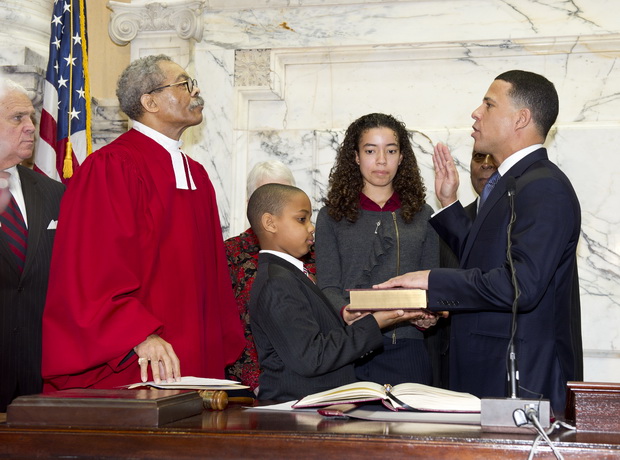Such hearings typically arise after a family or guardian alleges that a district has failed to provide a student with special education services up to a federally set standard. These are often complicated disputes, involving voluminous evidence and bringing under scrutiny a long course of conduct by the school district. Often, the further accommodation demanded involves high costs, sometimes financial costs to the district, sometimes redeployments of resource allocation or classroom attention borne by other students or educators.
In Maryland, as in the great majority of states, the rule is that the complainant seeking legal relief bears the legal burden of showing that the complaint is valid.
That reflects the conventional rule, familiar from across our legal system, that the side seeking the law’s intervention shoulders the burden of proof.
It’s also a matter of basic fairness. Complaints often function in effect as accusations against responsible persons, such as educators or administrators, and requiring accused parties to show that they have *not* broken the rules isn’t what many of us would call fair.
But that’s what House Bill 294 (Del. Atterbeary), cross-filed with S. 926 (Sen. A. Washington), would do. It’s backed by some parents and by some professional hearing advocates and attorneys, who have a professional organization based in Towson. It’s also been endorsed by the state PTA.
In Schaffer v. Weast, a 2005 case at the U.S. Supreme Court that arose from Montgomery County, the high court ruled that absent specific guidance the burden of persuasion was properly placed on the complainants. That still left room for states to adopt a contrary rule placing the burden on districts. A few states have done that, including New York, New Jersey, and Connecticut.
The fiscal and policy note for HB 294 notes that New Jersey saw a “surge in the number of due process hearings within the first year after enactment” of its burden-shifting bill, but says the surge subsided. If the change turned some complaints from losers into winners, it would be natural for a new equilibrium to emerge as districts stopped fighting cases it now saw as losers and retreated to a new defensible line (which might include some cases that would never have been brought at all before the switch). As the fiscal note acknowledges, when complainants prevail in more cases, the underlying costs of providing special ed services are likely to increase, aside from the expenditure of resources on the hearings themselves.
On a practical level, even without this thumb on the scale, many special ed complainants succeed in jerking around districts for unjustified concessions simply by threatening systems with the high cost and uncertainty of legal challenge.
And if you worry that schools are obsessively bureaucratic now, wait till word gets out that a complainant can come in later with any old crazy allegation and the burden will be on you as educator to disprove it, so you’d better document every single thing forever.
In testimony on behalf of MABE, the Maryland Association of Boards of Education, attorney John Woolums said MABE was “concerned with the potential unintended consequences of shifting the burden of proof; including the increase in cost and duration of IEP [Individualized Education Plan] challenges and the resulting delay in students receiving the services they need until the completion of the dispute.”
Karen Yoho, an elected member of the Frederick County school board, said in an interview that among the potential unintended consequences was taking providers away from students. “One of the main concerns from special ed teachers is all the defensive practice school systems will expect from special ed teachers, greatly increasing their workload,” Yoho said. “And additional meetings, taking them away from their students, which time has to be made up.”
MSEA, the Maryland State Education Association, opposes the bill on similar grounds.
Better for Maryland not to go down this road.







This a very revealing piece that not only shows bias to former administration agenda, but also has zero comprehension of the state of special education in Maryland. The piece fails to mention the imbedded advantage school systems have: budget for legal, understanding of complex data and the ability to misrepresent to parents. Parents of special education students have been steamrolled by school systems for decades. This bill seeks to just move the needle a little to empower parents of kids with disabilities! I have a hard time swallowing that anyone that would oppose that.
As one of the original proponents of the first burden of proof bill several years ago, I did the original research on what happened in both New Jersey and New York in the aftermath of their Burden of Proof bills.
My research found that immediately following passage of their bills, neither New York nor New Jersey saw an increase in the number of complaints filed. In fact, New Jersey had fewer complaints, New York about the same number, and both New Jersey and New York experienced a decrease in the number of due process hearings.
Moreover, MSEA’s opposition stands in stark contrast to the New York teachers union, NYSUT, which recognized the injustice of saddling special education parents with the burden of proof and advocated with parents in New York to pass its bill.
As explained by the NYSUT in 2007 when New York enacted its burden of proof law:
“This corrects an injustice. It is unfair to put this burden on parents, especially those who do not have the financial means to hire an attorney and navigate the special education hearing process,” said NYSUT Executive Vice President Alan B. Lubin, who thanked state Sen. Andrew Lanza, R-Staten Island, and Assemblywoman Cathy Nolan, D-Queens, for sponsoring the bill. “And, we applaud the governor for signing it.”
Several states have passed burden of proof bills, because it’s the right thing to do, and because the current system is fundamentally unfair to special education families – especially those who cannot afford lawyers.
Excellent response to the opinion piece that woefully misses the mark. Thank you!
H hopefully my comment is showing up as a reply to Julie Reiley as intended! (Not the article author!)
I find it hard to believe the author thoroughly researched this legislation. Burden of Proof is a civil rights issue for special education families.
I wish I had time for a full reply but I’m busy working a full time+ job and homeschooling my autistic son because he was not receiving an education and was not physically safe in his local Maryland public school. My situation is not unique. As such, I’ll just make a few quick points. 1) As Justice Ginsburg pointed out in her dissent to Schaffer v. Weast, it is, in fact, not universal in US law that burden of proof rests with the complainant. 2) Yes, in most (but not all) cases, parents are fighting for more resources for their disabled children, and those resources are likely to cost money. IDEA, the law that governs provision of special education services in public schools, explicitly says that cost can not be a determining factor in whether services are provided. 3) The author points out an initial surge in complaints in the first year after the burden shift in NJ, but neglects to mention that it corrected itself in following years and similar surges have not been observed in other states which made the switch, including NH. That said, a surge in complaints in and of itself is only an argument against the shift in burden if it were determined that those complaints were frivolous. 4) The idea that parents of disabled children will now rush to make frivolous complaints is insulting and uninformed. Going to due process will still require an attorney and tens of thousands of dollars (or more!). It is not something anyone embarks on lightly, especially when many of us are already spending every extra penny we have on private services for our children (my son, for example, has variously received occupational therapy, psychotherapy, speech therapy, social skills therapy, and private tutoring, all paid for privately, with only a small fraction covered by insurance). I personally know someone who had to mortgage their home to pay for an attorney in order to get their child a meaningful education. I know many more people without any means to take on their local school system. 5) It is indeed regrettable that teachers are burdened with paperwork in order to support the denial of educational services to disabled children. I doubt any educator will tell you that they got into this business because that’s how they wanted to spend their time. No, they got into this to help children. Wouldn’t it be amazing if local school districts, local school boards, county, state, and federal governments gave schools and teachers the resources they needed to do just that, rather than spending what little resources they have on lawyers and defensive paperwork in order to continue giving our most vulnerable children the bare minimum they can legally get away with?
I disagree. I have been an expert in many special education hearings and seen firsthand how disadvantaged parents are in the due process hearing, even if they can afford a special education attorney (which most cannot). Federal and State laws require the schools to develop an Individualized Education Program (IEP) that will be beneficial and appropriate. The school team has the power to make any change to a child’s program, including reducing or eliminating services and therapies, changing a child’s school-literally requiring the child to be bussed out of the neighborhood, determine whether the child has a behavior plan or whether the child will have evaluations for areas of disability. The schools make all the decisions about the child’s special education program. The schools make these decisions at times even if parents disagree. The schools are already required to do paperwork and monitor progress, so shifting the burden does not increase workload. The schools have the specialists, attorneys, administrators-the parents do not. The schools control what information the parents receive, and decide what information parents will not receive. The parents are severely disadvantaged, don’t understand the complex special education process and MUST use filing a request for a due process hearing in order to stop the school from making changes over parent objection (to initiate “stay put”, so the most recently agreed-upon IEP stays in place until a dispute is solved). Parents are further disadvantaged, not knowing how to put on a legal case, show evidence and question witnesses. The schools have to provide a free appropriate public education anyway, so the schools should have the burden to demonstrate that the IEP program or program changes will benefit the child and provide the child with a free appropriate public education.
The author states that hearings typically arise when services don’t meet a federal standard. This is misleading. Parents need to prove that the school is not providing a Free Appropriate Public Education and not following the child’s IEP, which the schools write, and is a legal document. It is not some overly stringent federal standard. Placing the burden on schools only means that they present their case first – a case that they are required to have prepared 5 days before the hearing – and convince the judge that they are more likely than not to have proven their case. If parents have to go first (by having the burden of proof) and can’t afford an attorney, their case can get thrown out on procedural technicalities and the school never has to present anything. Of course, schools have already paid their attorneys for the preparation. It is time to stand up for our low income families who already have huge struggles with their children with disabilities.